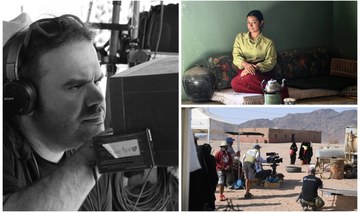TUNIS: Actress Claudia Cardinale may have been a sixties legend of Italian and French cinema, but in Tunisia, in the portside district where she grew up, she says she feels “at home.”
“I left very young, but I spent my whole childhood here, my adolescence,” said Cardinale, now 84. “My origins are here.”
To celebrate her connection to the North African country, authorities on Sunday named a street after her in the La Goulette suburb of the capital Tunis, where petals were scattered in a ceremony in her honor.
“You marked the world of cinema for almost half a century with your dazzling beauty, your charisma and through the roles you played,” said Amel Limam, the mayor of La Goulette.
“I am very honored, because it is here that I was born and spent my childhood,” Cardinale said. “I kiss you!“
The multicultural beachfront neighborhood was once home to a sizeable Sicilian population — including Cardinale’s parents.
Before Tunisia’s independence from France in 1956, more than 130,000 Italians were resident, and many of their ancestors had settled there before French colonial rule.
“I still keep a lot of Tunisia inside me — the scenery, the people, sense of welcome, the openness,” Cardinale told AFP.
In 1957, aged 19, Cardinale won a beauty contest for “the prettiest Italian” in newly independent Tunisia.
Her prize was a trip to the Venice film festival, where she caught the eye of influential cinema figures.
That led to her first film role, in Mario Monicelli’s Le Pigeon.
Soon afterwards, she moved with her family to Rome to pursue her career, which took off with a role in Luchino Visconti’s film The Leopard, alongside French film star Alain Delon and Hollywood legend Burt Lancaster.
That was the start of a long career that has continued into her 80s. After starring in The Pink Panther opposite David Niven in 1963, she shot to attention in the United States and Britain.
In one of her latest roles, she plays a grandmother in a film by Tunisia’s Ridha Behi, “L’ile du Pardon,” currently in post-production.
Her parents never recovered from their departure from Tunisia, which they experienced as an exile.
“It was very hard. My father never wanted to come back, that’s how much he dreaded the pain of what was for him a real heartbreak,” she said.
“My mother recreated Tunisia in Italy. She planted all Tunisian plants and kept on cooking Tunisian meals.”
But Cardinale said the Tunisian sense of hospitality can be a model for how to treat migrants.
The country “can and should be proud of its history,” she said.
And in an era when many Tunisians are willing to risk their lives boarding unseaworthy boats to reach Europe, she stresses the importance of “remembering this shared past to build the future.”
“The wind changes, and we’re all equal in terms of the need to leave,” she said.
“Tunisia for us was a welcoming land. I wish everyone in the world who needs to leave somewhere could receive the same welcome.”
60s filmstar Claudia Cardinale honored in Tunisian birthplace
https://arab.news/gwa4z
60s filmstar Claudia Cardinale honored in Tunisian birthplace
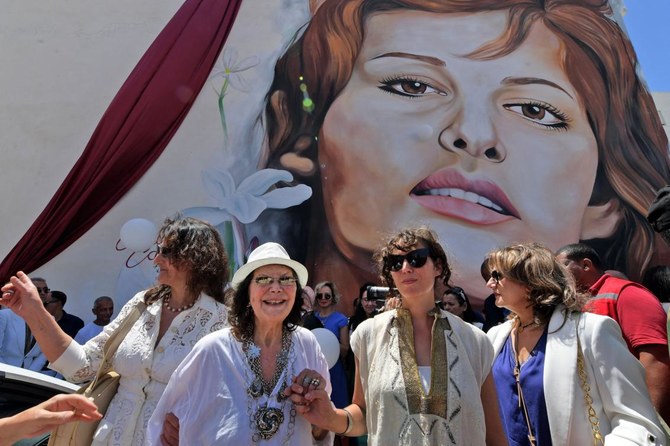
- Street named after actress Claudia Cardinale in La Goulette, a suburb of Tunis, where she grew up
- Cardinale: ‘I still keep a lot of Tunisia inside me — the scenery, the people, sense of welcome, the openness’
Hollywood Arab Film Festival: Showcasing Arab cinema in Los Angeles
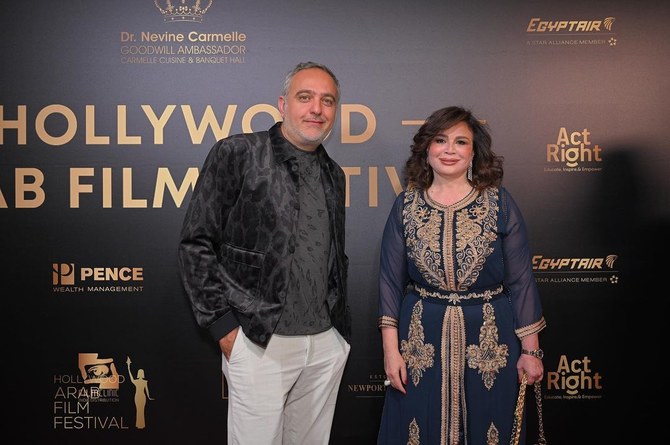
LOS ANGELES: The third annual Hollywood Arab Film Festival began this week, bringing the best of 2024’s Arab cinema to Los Angeles and giving fans a chance to see the films in theaters as well as introducing a new audience to the Arab world’s top talent.
The event, which runs until April 21, was attended by a number of celebrity guests including Egyptian producer and screenwriter Mohamed Hefzy, Tunisian actor Dhaffer L’Abidine, renowned Egyptian star Elham Shahin and Egyptian producer Tarek El-Ganainy.
At the event, Hefty said: “Arab cinema really needs a platform to tell our stories and to show who we are, our identity, our hopes and dreams, our pains, and all the different social topics that are tackled in some of the films that are being presented are maybe more relevant today than ever. So I think it’s a great opportunity to have this dialogue.”
Hefzy’s film “Hajjan” was showing at the event. It is a Saudi Arabia-based film directed by Egyptian filmmaker Abu Bakr Shawky.
“Hajjan is a film about a young boy who got a very special connection to his camel, who has a brother who was a camel jockey and races,” Hefzy said. “And, one day when something really unexpected happens to his brother, and shatters his world, it forces him to step into his brother’s shoes and become a camel jockey, and so starts racing himself.”
The movie is a co-production between the Kingdom’s King Abdulaziz Center for World Culture, or Ithra, and Hefzy’s Film Clinic.
“It was a film made in Saudi Arabia with Saudi talents and actors with an Egyptian director, but with the Saudi co-writer and Saudi actors and shot mostly in Saudi Arabia,” Hefzy said. “So I think it’s, it was a great experience, and learned a lot about Saudi Arabia, learned a lot about the culture.”
The festival featured cinema from various Arab countries, presenting films from 16 different nations. Marlin Soliman, strategic planning director of HAFF, highlighted the inclusion of six feature films, ten short films and six student films.
Spanning five days, HAFF offered its audience a vibrant experience, including a red-carpet affair, panel discussions on filmmaking and diversity in Hollywood, and, of course, screenings of high-profile films.
The festival also saw several filmmakers singing the praises of Saudi Arabia’s expanding film industry.
L’Abidine, the writer and director of “To My Son,” said: “I’m thrilled to be back again with my second feature film ‘To My Son,’ a Saudi film… I think there is a great evolution of Saudi cinema that’s been happening in the last few years.”
Dave Chappelle to perform at Abu Dhabi Comedy Week

DUBAI: US award-winning comedian Dave Chappelle is set to perform in the UAE at the Abu Dhabi Comedy Week on May 23, organizers announced on Friday.
The capital city’s first-ever comedy festival will run from May 18-26 at Yas Island’s Etihad Arena.
Chappelle will join a long list of comedians performing at the event, including Chris Tucker, Aziz Ansari, Tom Segura, Jo Koy, Tommy Tiernan, Kevin Bridges, Andrew Santino, Bobby Lee, Andrew Schulz, Bassem Youssef and Maz Jobrani.
With numerous accolades and awards to his name, including multiple Grammy Awards and Emmy Awards, Chappelle is renowned for his wit and fearless commentary on contemporary issues.
While May 23 will mark Chappelle’s inaugural performance in Abu Dhabi, he has previously captivated audiences with two sold-out shows in Dubai.
REVIEW: Amazon Prime Video’s ‘Fallout’ takes gaming adaptations to next level
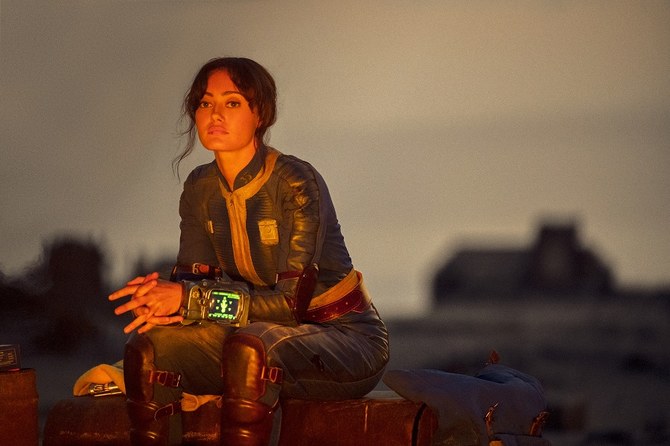
LONDON: Don’t say it too loud, but we might, finally, have reached the point when good TV adaptations of hit videogames become the norm, rather than the exception. Hot on the heels of “The Last of Us” and “The Witcher” comes “Fallout,” an eight-part series based on the post-apocalyptic world explored in the series of famed Bethesda games.
In an alternate future, with the world devastated by a global nuclear war, a community of wealthy individuals retreats to a series of underground vaults to ride out the fallout. Some 200 years later, wide-eyed vault dweller Lucy (Ella Purnell) is forced to leave the safety of her underground home when her father is kidnapped by raiders from the surface, kickstarting a journey that will not only make her confront the horrors of the unlawful society above, but also sees her meet a revolving door of eccentric (yet equally horrifying) characters along the way. Among these are Maximus (Aaron Moten), a squire in the militaristic Brotherhood of Steel, and The Ghoul (Walton Goggins), a terrifyingly mutated former actor now forging his way as a bounty hunter.
The key to the success of “Fallout” is that your enjoyment of the show is not dependent on whether or not the previous paragraph made any sense to you whatsoever. Rather, creators Graham Wagner and Geneva Robertson-Dworet, along with developers (and executive producers) Christopher Nolan and Lisa Joy have taken the wise decision to create a world wherein knowledge of the wider “Fallout” universe is a bonus, but not a prerequisite. So even if this is your first introduction to the world of Pip-Boys, gulpers and Vaulters, you won’t be penalized, and you certainly won’t feel like you’re missing out.
The world of “Fallout” is a gloriously gritty, bloody and savage one, but it’s also one of razor-sharp humor and fiendish satire — not least thanks to Goggins’ phenomenal turn as The Ghoul. Acerbic and frighteningly violent, The Ghoul is the very embodiment of the savage, unforgiving wasteland, and Goggins has a blast with perhaps the role of his career to date. Lucy is the polar opposite, and Purnell is equally as great as the naïve-yet-capable young woman entirely unprepared for the muck and murder she emerges into. Throw the two together with a razor-sharp, witty script and top-drawer production values and you have a show that’s about as much fun as you can have without a controller of your own.
Gulf Cinema Festival celebrates region’s rising stars
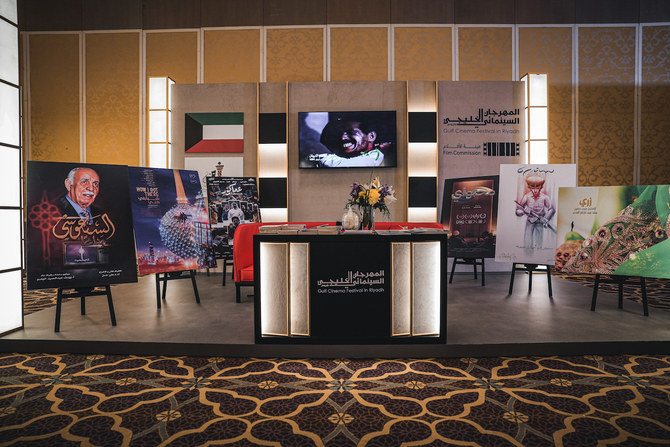
- ‘We learn from each other,’ Omani director Muzna Almusafer says
- Success of industry ‘enhances Kingdom’s soft power on global stage,’ Saudi director Musab Alamri says
RIYADH: Leading lights and rising stars from the region’s blossoming film industry have been gathering this week at the fourth Gulf Cinema Festival in Riyadh.
Among them is Omani director Muzna Almusafer, whose movie “Clouds” is in the running for a prize of SR50,000 ($13,300) in the shorts category.
Set in southern Oman, the film tells the story of a war veteran and widower as he navigates the crossroads of societal expectations and his values.
“It was a dream for me at the beginning, to write such a story … something very sensible, something very honest, something from my own life and what I encountered in my life,” Almusafer told Arab News.
“I don’t know if I will win, but I’m winning this,” she said. “I’m winning knowing you, knowing people. For me, this is an honor and this is a win itself.”
Speaking about the movie industry in Oman and Saudi Arabia, she said: “We learn from each other. It’s not about who is first and who is second. It’s about who can reflect better and who can say things better. And better is always depending on us as people, how we look at things and depending on the audience.
“As artists, we can teach people how to look at life from a different point of view.”
Two of the keys to the success of the region’s movie industry were funding and drive, she said.
“Funding is the first thing, because when you want to pay actors, when you want to pay a scriptwriter, it’s always money at the beginning.
“But then also your drive. It has to be lit all the time. You should have this fire inside you. You shouldn’t stop. Once you stop, you don’t have it. So it’s important that you continue and you know and you learn.”
Saudi movie director and critic Musab Alamri said the landscape of cinema in the region was changing.
“Previously, the UAE held the top position in box office sales. However, since 2022, Saudi Arabia has emerged as the leader in ticket sales revenue. Saudi Arabia now holds the top spot in the MENA region and ranks 14th globally in terms of revenue generation,” he told Arab News.
Where Qatar and the UAE were once the leaders in financial support for movie projects, Saudi Arabia was now in the driving seat, he said.
“Saudi Arabia has witnessed the emergence of significant financing opportunities, including the Red Sea International Festival Fund, the Cultural Development Fund, Daw Film and production support programs at the Ithra Center.”
The film “Norah” by Tawfik Alzaidi was an example of how far the industry had come, Alamri said.
The film, which received funding from the Saudi Film Commission under its Daw initiative, garnered a nomination for this year’s Cannes Film Festival in the ‘Un Certain Regard’ section, he said.
“Such successes highlight the significant impact of these programs in fostering the growth and recognition of Saudi cinema on the international stage.”
Despite a decline in feature production across the Gulf, the Saudi film industry was riding high, Alamri said.
“Throughout the past year and into the first quarter of 2024, there has been a monthly release of Saudi films in cinemas and on digital platforms such as Netflix. Saudi cinema has also gained prominence in international film festivals, with six Saudi feature films showcased at the recent edition of the Red Sea International Festival.
“This surge in Saudi cinema not only contributes to the local economy but also enhances Saudi Arabia’s soft power on the global stage.
“I anticipate that within the next eight to 10 years, Saudi Arabia will achieve self-sufficiency in film production, eliminating the need for direct government support. Saudi films will garner significant recognition at prestigious international festivals including Cannes, Sundance, Venice, Toronto and Berlin.”
Saudi actor Baraa Alem said government initiatives, local and regional film festivals and the rise of independent filmmakers had all contributed to the “cultural richness” of the region’s movie industry.
The recognition received by movies like “Norah” and “Four Daughters,” which was supported by the Red Sea Fund and nominated for an Academy Award, was evidence of “that hard work,” he said.
Speaking about the Gulf Film Festival, he said: “By providing a forum for filmmakers, industry professionals and audiences to connect and engage, the festival not only celebrates the region’s cinematic achievements but also stimulates dialogue, creativity and innovation … (and contributes) to the continued growth and development of the Gulf film industry.
“As filmmakers from the gulf we share similar cultural values and identities.”
The festival ends on Thursday.
Johnny Depp appears at UK premiere of Saudi-backed film ‘Jeanne du Barry’

DUBAI: US actor Johnny Depp said he felt “strangely, oddly, perversely lucky” to have been offered the role of French King Louis XV at the UK premiere of his new film “Jeanne du Barry.”
Saudi Arabia’s Red Sea Film Festival Foundation provided post-production support for the period drama, marking the first time the foundation co-produced a French movie.
Depp was accompanied by the film’s co-star and director Maïwenn on stage at the Curzon theater in Mayfair, where the duo briefly introduced the film.
“I feel very lucky to have been [offered the role] – strangely, oddly, perversely lucky,” he said on stage in London, according to Variety. “Because when Maïwenn and I first actually met and talked about the notion of me doing the film and playing Louis XV, the King of France — see that’s when instantly what happens in your brain is you instantly go back to Kentucky, where, like, everything is fried. So you realise that you’ve come from the bellybutton of nowhere and suddenly you end up playing the King of France.”






